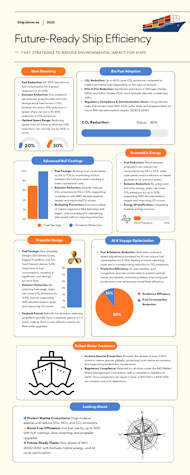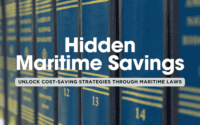Top 30 Cost Saving Habits in Maritime Shipping

In the highly competitive maritime shipping industry, cost management is crucial for maintaining profitability and operational efficiency. With fluctuating fuel prices, stringent environmental regulations, and increasing operational costs, companies must adopt innovative strategies to stay ahead. This comprehensive guide outlines 30 effective cost-saving habits that can help maritime shipping companies reduce expenses, optimize operations, and enhance their competitive edge. By implementing these strategies, businesses can navigate the challenges of the industry while maximizing their financial performance.
Infographic: Future-Ready Ship Efficiency
This infographic reveals the Top 7 Innovations Transforming Maritime Efficiency. From fuel-slashing upgrades to AI-powered optimization, these strategies are reshaping how ships operate — cutting costs, boosting efficiency, and driving fleets toward a greener future.
1. Implementing Fuel Efficiency Measures
Fuel costs represent a significant portion of a ship’s operating expenses. Adopting fuel efficiency measures can lead to substantial savings.
Slow Steaming
- Reduces fuel consumption by operating at lower speeds.
- Extends the life of the engine and reduces maintenance costs.
Hull Cleaning and Coatings
- Regular hull cleaning reduces drag and improves fuel efficiency.
- Advanced coatings can prevent biofouling, leading to smoother sailing.
Route Optimization
- Utilizing advanced software to plot the most efficient routes.
- Avoids adverse weather conditions and reduces fuel consumption.
2. Regular Maintenance and Inspections
Proactive maintenance and inspections can prevent costly repairs and downtime.
Scheduled Maintenance
- Following a strict maintenance schedule ensures that potential issues are addressed before they become major problems.
- Reduces unexpected breakdowns and extends the life of the equipment.
Inspections and Audits
- Regular inspections can identify wear and tear early.
- Conducting audits helps maintain compliance with regulations and standards.
3. Efficient Crew Management
Optimizing crew management can significantly reduce operational costs.
Training and Development
- Investing in crew training improves efficiency and safety.
- Skilled crew members can perform tasks more effectively, reducing errors and downtime.
Crew Rotation
- Implementing effective crew rotation schedules to minimize fatigue.
- Reduces the risk of accidents and improves overall productivity.
4. Utilizing Technology
Leveraging modern technology can lead to significant cost savings and improved operational efficiency.
Automation
- Implementing automation systems for routine tasks reduces the need for manual labor.
- Improves accuracy and efficiency in operations.
Monitoring Systems
- Using advanced monitoring systems to track fuel consumption, engine performance, and other critical parameters.
- Enables timely interventions and adjustments to optimize performance.
5. Strategic Partnerships and Alliances
Forming strategic partnerships and alliances can offer numerous financial benefits.
Bulk Purchasing
- Partnering with other companies for bulk purchasing of supplies and fuel.
- Secures better rates and discounts due to higher volume orders.
Shared Resources
- Collaborating with other companies to share resources like equipment and facilities.
- Reduces individual costs and maximizes resource utilization.
6. Optimizing Inventory Management
Effective inventory management ensures that ships carry only what is necessary, reducing costs and improving efficiency.
Just-In-Time Inventory
- Adopting a just-in-time inventory system to minimize storage costs.
- Ensures that supplies are available when needed, reducing excess inventory.
Automated Inventory Tracking
- Implementing automated tracking systems to monitor inventory levels in real-time.
- Helps avoid overstocking or understocking, reducing waste and ensuring optimal supply levels.
7. Energy Efficiency Upgrades
Upgrading to more energy-efficient systems and equipment can lead to significant cost savings.
LED Lighting
- Replacing traditional lighting with LED lights reduces energy consumption.
- LED lights have a longer lifespan, reducing replacement costs.
Energy-Efficient HVAC Systems
- Upgrading to energy-efficient heating, ventilation, and air conditioning (HVAC) systems.
- Reduces energy costs and improves the comfort of the crew.
8. Waste Reduction and Recycling
Implementing waste reduction and recycling programs can save costs and improve environmental sustainability.
Waste Segregation
- Separating waste materials to enhance recycling efforts.
- Reduces disposal costs and promotes environmental responsibility.
Recycling Programs
- Establishing recycling programs for materials like plastics, metals, and paper.
- Generates revenue from recycled materials and reduces waste disposal costs.
9. Enhancing Operational Procedures
Streamlining and improving operational procedures can lead to significant cost reductions.
Standard Operating Procedures (SOPs)
- Developing and enforcing SOPs for all operational tasks.
- Ensures consistency, reduces errors, and improves efficiency.
Performance Monitoring
- Regularly monitoring and analyzing performance data to identify areas for improvement.
- Implementing changes based on data-driven insights to optimize operations.
10. Strategic Fleet Management
Efficient fleet management can reduce costs and improve overall operational effectiveness.
Fleet Standardization
- Standardizing the fleet with similar types of vessels.
- Reduces maintenance costs and simplifies training for crew members.
Lifecycle Cost Analysis
- Conducting lifecycle cost analysis for vessels to determine the most cost-effective options.
- Helps in making informed decisions about repairs, upgrades, and replacements.
11. Utilizing Alternative Fuels
Exploring alternative fuels can reduce costs and environmental impact.
Liquefied Natural Gas (LNG)
- Using LNG as an alternative to traditional marine fuels.
- LNG is often cheaper and produces fewer emissions.
Biofuels
- Incorporating biofuels into fuel mixes.
- Reduces dependence on fossil fuels and can lower overall fuel costs.
12. Chartering Optimization
Optimizing the chartering process can lead to substantial cost savings.
Flexible Charter Agreements
- Negotiating flexible charter agreements to adapt to market conditions.
- Allows for adjustments based on demand and reduces costs during low-demand periods.
Time Charter vs. Voyage Charter
- Choosing the appropriate type of charter based on specific needs.
- Time charters can offer more control over costs, while voyage charters can be more economical for short-term needs.
13. Streamlined Port Operations
Efficient port operations can reduce costs and turnaround times.
Efficient Loading and Unloading
- Implementing advanced loading and unloading techniques to minimize port time.
- Reduces port fees and speeds up delivery schedules.
Digital Port Management Systems
- Using digital systems for port management to streamline operations.
- Enhances coordination and reduces delays, leading to cost savings.
14. Environmental Compliance
Staying ahead of environmental regulations can prevent costly fines and enhance efficiency.
Emission Control Areas (ECAs) Compliance
- Ensuring compliance with ECA regulations to avoid fines.
- Using low-sulfur fuels or scrubbers to meet emission standards.
Ballast Water Treatment
- Installing advanced ballast water treatment systems to comply with regulations.
- Reduces the risk of penalties and promotes environmental sustainability.
15. Risk Management and Insurance
Effective risk management and insurance strategies can save costs in the long run.
Comprehensive Insurance Coverage
- Securing comprehensive insurance coverage to protect against various risks.
- Reduces financial impact from accidents, cargo loss, and other incidents.
Risk Assessment Programs
- Implementing regular risk assessments to identify and mitigate potential hazards.
- Proactive risk management can prevent costly incidents and ensure smoother operations.
16. Digital Transformation
Adopting digital technologies can streamline operations and reduce costs.
Internet of Things (IoT)
- Using IoT devices to monitor ship performance and conditions in real-time.
- Enables predictive maintenance and reduces downtime.
Big Data Analytics
- Analyzing large sets of data to optimize operations.
- Helps in identifying inefficiencies and areas for cost savings.
17. Enhanced Cargo Management
Effective cargo management can lead to significant cost reductions.
Optimized Stowage Plans
- Creating efficient stowage plans to maximize cargo space utilization.
- Reduces the number of trips and associated costs.
Cargo Tracking Systems
- Implementing advanced cargo tracking systems for real-time monitoring.
- Improves logistics and reduces losses or delays.
18. Energy Management Systems
Energy management systems can help in tracking and reducing energy consumption.
Energy Audits
- Conducting regular energy audits to identify areas of high consumption.
- Implementing energy-saving measures based on audit findings.
Renewable Energy Sources
- Incorporating renewable energy sources like solar or wind power.
- Reduces reliance on traditional fuels and lowers energy costs.
19. Sustainable Practices
Adopting sustainable practices can lead to long-term cost savings and improved reputation.
Green Certifications
- Obtaining green certifications for vessels to demonstrate environmental commitment.
- Can lead to financial incentives and improved marketability.
Sustainable Sourcing
- Sourcing materials and supplies from sustainable sources.
- Often results in lower costs due to reduced waste and improved efficiency.
20. Continuous Improvement Programs
Establishing a culture of continuous improvement can drive ongoing cost savings.
Lean Management
- Implementing lean management principles to eliminate waste and improve processes.
- Focuses on value-added activities and reduces unnecessary costs.
Employee Suggestion Programs
- Encouraging employees to suggest cost-saving ideas.
- Engages the workforce and taps into on-the-ground insights for improvements.
21. Advanced Navigation Systems
Investing in advanced navigation systems can improve efficiency and reduce operational costs.
GPS and AIS Integration
- Using integrated GPS and Automatic Identification Systems (AIS) for precise navigation.
- Reduces travel time and fuel consumption by avoiding inefficient routes.
Electronic Chart Display and Information System (ECDIS)
- Implementing ECDIS for real-time navigation and route planning.
- Enhances safety and efficiency, reducing the risk of costly navigational errors.
22. Efficient Procurement Practices
Optimizing procurement practices can lead to substantial cost savings.
Strategic Sourcing
- Establishing long-term relationships with reliable suppliers.
- Negotiating better terms and prices through bulk purchasing agreements.
E-Procurement Systems
- Utilizing e-procurement systems to streamline purchasing processes.
- Reduces administrative costs and improves procurement efficiency.
23. Cost-Effective Communication Systems
Effective communication systems can enhance coordination and reduce costs.
Satellite Communication
- Using satellite communication for reliable and cost-effective connectivity.
- Ensures seamless communication between ships and shore offices.
VoIP Solutions
- Implementing Voice over Internet Protocol (VoIP) solutions for lower communication costs.
- Reduces the need for expensive traditional phone systems.
24. Sustainable Waste Management
Implementing sustainable waste management practices can lead to cost savings and environmental benefits.
Waste-to-Energy Systems
- Installing waste-to-energy systems to convert waste into usable energy.
- Reduces waste disposal costs and generates additional energy.
Composting and Biodegradable Materials
- Using composting systems for organic waste.
- Reduces landfill fees and promotes sustainability.
25. Effective Crisis Management
Developing and implementing effective crisis management plans can mitigate costs associated with emergencies.
Emergency Response Training
- Providing regular training for crew members on emergency response procedures.
- Reduces the impact of emergencies and ensures quick resolution.
Contingency Planning
- Developing comprehensive contingency plans for various scenarios.
- Ensures preparedness and minimizes operational disruptions and associated costs.
26. Efficient Docking Practices
Optimizing docking practices can save time and money.
Automated Docking Systems
- Using automated docking systems for precision and speed.
- Reduces docking time and associated costs.
Quick Turnaround Protocols
- Implementing quick turnaround protocols to minimize port stay.
- Reduces port fees and maximizes ship utilization.
27. Enhanced Security Measures
Investing in security measures can prevent costly incidents.
Surveillance Systems
- Installing advanced surveillance systems to monitor ship security.
- Deters theft and vandalism, reducing potential losses.
Cybersecurity Protocols
- Implementing robust cybersecurity measures to protect against cyber threats.
- Prevents costly data breaches and operational disruptions.
28. Comprehensive Insurance Reviews
Regularly reviewing and optimizing insurance policies can lead to cost savings.
Risk-Based Insurance
- Opting for risk-based insurance policies tailored to specific operational risks.
- Ensures adequate coverage while avoiding unnecessary premiums.
Policy Consolidation
- Consolidating multiple insurance policies for better terms and lower costs.
- Simplifies management and reduces administrative expenses.
29. Collaborative Logistics
Collaborating with other companies on logistics can reduce costs and improve efficiency.
Shared Shipping Routes
- Partnering with other companies to share shipping routes and cargo space.
- Reduces fuel and operational costs through economies of scale.
Joint Warehousing
- Utilizing shared warehousing facilities with other companies.
- Lowers storage costs and improves logistics coordination.
30. Regular Financial Audits
Conducting regular financial audits can uncover areas for cost savings.
Internal Audits
- Performing internal audits to ensure financial efficiency and compliance.
- Identifies wasteful spending and areas for cost reduction.
Third-Party Reviews
- Engaging third-party auditors for an objective assessment of financial practices.
- Provides insights into potential savings and efficiency improvements.
Adopting cost-saving habits is essential for maritime shipping companies to thrive in a dynamic and competitive environment. The 30 strategies outlined in this guide provide a robust framework for reducing expenses, improving operational efficiency, and ensuring long-term sustainability. By embracing these practices, companies can not only enhance their profitability but also contribute to a more sustainable and efficient maritime industry. Implementing these cost-saving measures requires commitment and continuous improvement, but the potential rewards make it a worthwhile investment for any maritime shipping business.

Do you have a Maritime Product or Service that may be of interest to Shipowners? Tell us about it here!
Do you have feedback or insights? Please reach out to editor @ shipuniverse.com




